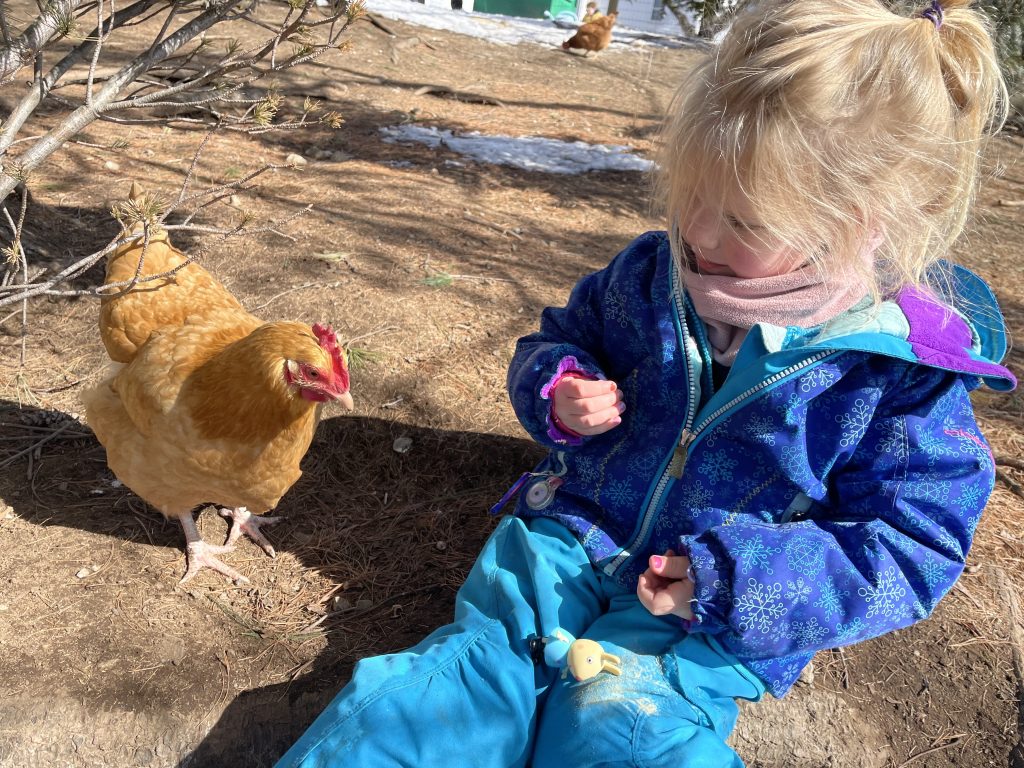Is Forest Friends a licensed preschool?
Yes! As of 2022, Forest Friends is a licensed small group program by the Massachusetts Department of Early Education and Care.
What is the application process?
For more information or to begin the application process, please reach out to ForestFriends@WLFarm.org. The Director will set up a tour with you and invite you to apply.
Do you have to re-enter the lottery each year?
Once your child has enrolled in the program, your child’s spot will be reserved until they age out of the program.
Will you give siblings priority in enrollment?
Yes. If your family is drawn in the lottery, we welcome all eligible children to interview for the program. As siblings age into the program, they will also be given priority as long as the other sibling is still enrolled in the program. If an older sibling ages out of Forest Friends, younger siblings will be given priority as long as there is space and they are 3 by June 1 of the school year.
Will there be "extended day" care available?
We are not currently offering care outside of the scheduled program times. Participants 4+ may participate in the Friday Forest Friends program. Additionally, some Forest Friends families participate in our other morning preschool programs at the farm, in addition to Forest Friends.
Will this program prepare my child for education in a traditional school?
Yes! The intention of programs like ours is to equip students with the tools necessary to continue their education. In addition to forming critical cognitive, social, and emotional skills, students will also develop their curiosity and interest in learning. Research shows that forest schools prepare students as well as (and sometimes better than) traditional schools (Kuo et al., 2019).
How do you keep the kids from wandering off?
Having a small class size of 10 students ensures that our two experienced teachers are able to keep an eye on the kids at all times. Additionally, staff will create clear policies for the group to ensure that students stay together. While we want to allow our students to have space to explore and discover independently, we will always make sure that they are safe and nearby.
How will you address ticks?
Forest Friends staff has a protocol to try to prevent tick bites and exposure as much as is possible. Closed-toed shoes, pants, and tall socks are helpful in avoiding tick bites. Staff will remove ticks if the tick is not yet embedded. However, if a tick is embedded in the skin, staff will not remove it but will immediately notify the student’s family.
Why is the age cut-off 3 by June 1?
The Forest Friends program takes place in a unique environment that challenges young children in different ways. The program requires stamina for hiking over varied terrain, a broad range of temperatures, and a four-hour day outside. The forest and farm environment presents a rich sensory experience for children that necessitates interacting with animals, weather and wind, mud, unpredictable sounds and smells.
Our multi-age group provides many benefits to children between the ages of three and five, and we endeavor to meet all of their physical, social and emotional needs. It is important for children to feel comfortable communicating with teachers and peers, using the bathroom independently, sharing, and working as a team. Since children typically develop more autonomy, physical strength, communication skills and the ability to recognize emotions and show empathy to peers between the ages of three to five years old, we believe that a cut-off of June 1st best supports the development of children in our program.
Will the mixed-age groups present issues between the older and younger students?
Inclusion is incredibly important to all of us at Wright-Locke Farm. Forest Friends staff will make sure all students feel welcomed, included, and accepted in our class. We believe that the mixed-age groups are beneficial as the students are able to learn from each other, interact with children of other ages, and practice inclusion every day. In fact, research suggests that mixed-age classrooms have lower rates of social isolation than same-age classrooms (McClellan & Kinsey, 1997). The staff seeks to intentionally create a team-like atmosphere for the class, full of sharing and healthy interdependence and free from cliques.
What's an example of a healthy and hearty snack?
Each day, the students will enjoy a nutritious snack. We will use this opportunity to model healthy, seasonal eating, using largely fruits, vegetables, and whole grains, as well as our own farm produce whenever possible. Examples of these snacks include soups, fresh fruits and vegetables, oatmeal, homemade granola and dried fruits, and homemade bread.
How involved will the students be in farm operations?
Each week, the groups will complete chicken chores! This includes collecting the chickens’ eggs, cleaning nesting boxes, and providing food and water for the chickens. Additionally, Forest Friends will help maintain an education garden by planting, weeding, watering, and harvesting a variety of herbs, fruits, and vegetables. On occasion, our farm crew may need Forest Friends’ help with their own farm chores!
Being so close to the farm property affords the classes opportunities to explore various aspects of the farm, experience the changes in seasons, and participate in farm activities throughout the year.

If you have additional questions about Forest Friends or are interested in applying, please contact ForestFriends@WLFarm.org.